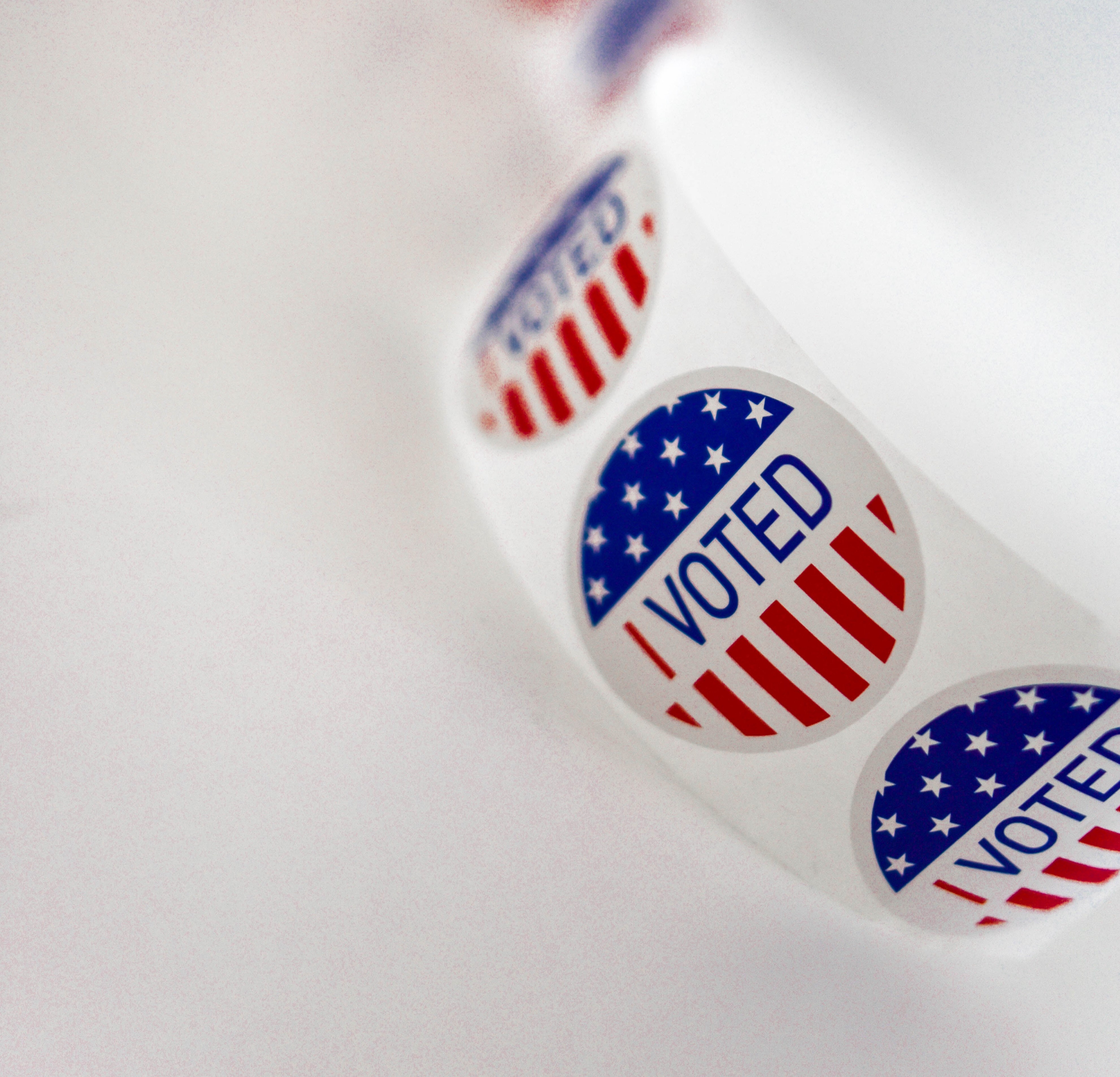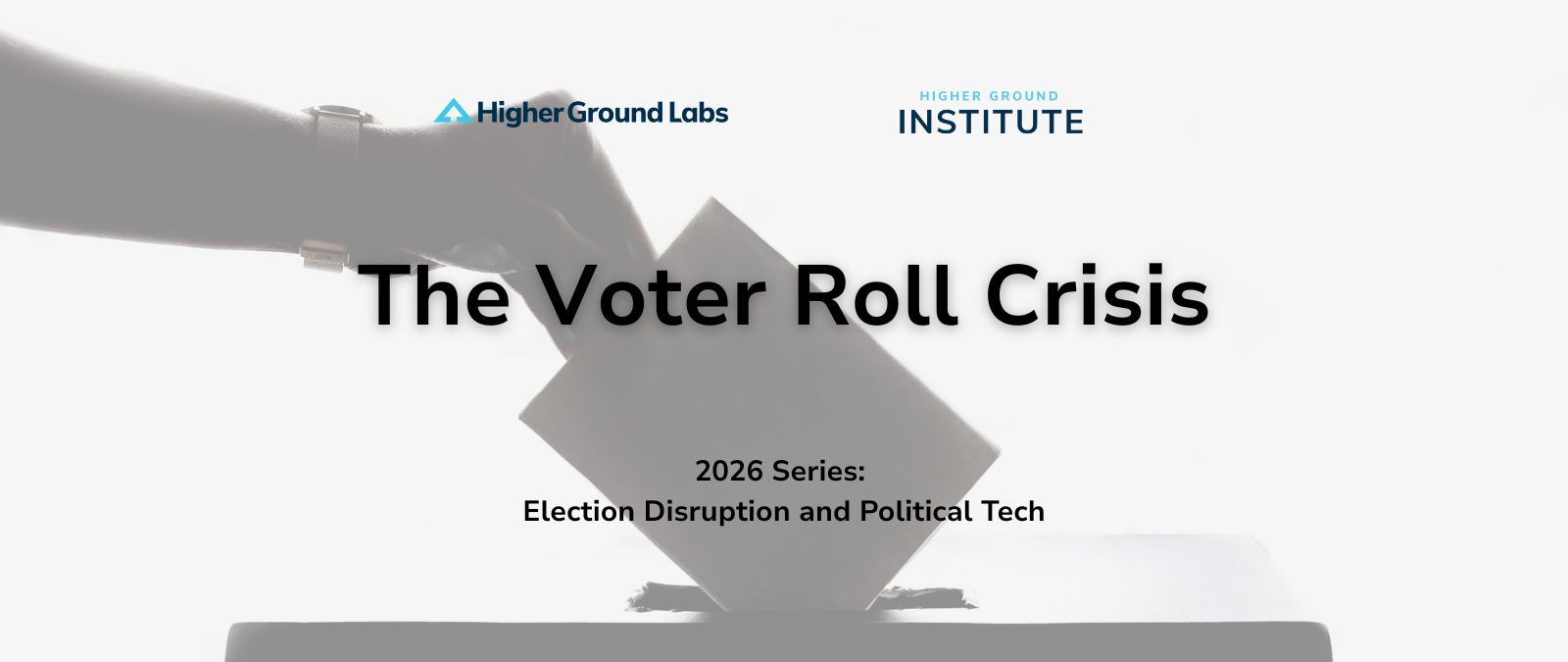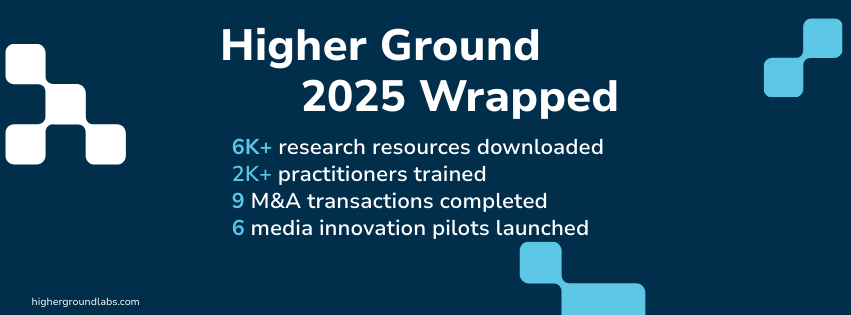Eighteen months after the founding of Higher Ground Labs, the 2018 Midterm Elections constituted a critical first test of our model. Our mission has been to fund a wave of nimble startups that could blend innovative energy, A-grade tech/design/data science, and private capital to build shared political infrastructure, lower costs, expand voter outreach, and optimize voter engagement. With that objective in mind, we seeded and accelerated 23 startups in the 2017-18 cycle. Nearly all of them went from alpha to beta to launch, and most were deeply embedded in this year’s elections.
Though we’re still taking stock, gathering data, and drawing lessons, here are a few early observations and conclusions from Election Day 2018:
New technology empowered candidates in toss-up races across the country to run better campaigns. Looking only at Higher Ground Labs companies — one segment in a broader landscape of new products and services serving progressive campaigns and causes — we see some clear evidence of meaningful competitive advantage. Indeed, several of our companies have already become core infrastructure for the progressive movement:
- Mobilize America: The Washington Post aptly described Mobilize as “Open Table for progressive activism.” Through its powerful model for collaborative online organizing, Mobilize America has built a bridge between over 250 outside progressive groups and all of the Democratic campaigns that needed their members. Mobilize’s partners – marquee groups like Move On, Pod Save America, Swing Left, EMILY’s List, Indivisible, Voto Latino, OFA, Flippable, Moms Demand Action – filled 776,196 volunteer shifts (with 123,837 shifts during the last four days of GOTV). 383,813 unique volunteers took action on Mobilize. Their mobilization of progressive volunteerism resulted in 36.5 million voter contact attempts. That is more total voter contact attempts than was reportedly performed in the 2016 Election effort
- BallotReady: BallotReady’s comprehensive data-set of every candidate running for every office in every state was relied upon by over 4.4 million visitors this election cycle, thanks in-part to a tweet from President Obama himself driving traffic to their site. Their website received over 1.0 million unique visitors on Election Day itself. Corporations and outside groups like Emily’s List, Patagonia, and Crooked Media relied on BallotReady to help their members and clients make custom ballot plans.
- Change Research: This innovative polling company worked with over 300+ races up and down the ballot to conduct several thousand polls over this election cycle. They provided affordable (<10% of the cost of live phone polls), speedy, and accurate polling to campaigns ranging from city council to Congress, for women and for men, for first-time candidates and DC insiders, for candidates of every color and every background. Change Research provided early indicators of Kendra Horn’s OK-5’s “surprise” victory and also called Andrew Gillum’s “surprise” primary win a week before the FL Primary.
- Swayable: This cycle, Swayable helped optimize progressive creative content to determine for 29 different client organizations across 22 different states and 30 congressional districts. They served every notable Democratic SuperPAC and Independent Expenditure effort this cycle. On average, Swayable was able to increase the measured potential impact of campaigns’ paid media by 100% or more.
- Tuesday Company/Team App: This year, every targeted “Red-to-Blue” DCCC House race in the country used the Team App to conduct friend-to-friend digital organizing. They were also relied upon by important top-tier US Senate and Governors races and were used by unions and nonprofits to support over 27,000 campaigns around the country.
- VoterCircle: VoterCircle’s friend-to-friend outreach platform worked with over 1,000 clients and nearly 200 races, including running successful campaigns for Senators Jon Tester and Tim Kaine. The platform sent over 1.0 million messages from friends to voters over the course of this election cycle.
- Hustle: Texting platform Hustle saw historic usage this midterm election cycle with 50,000 “Hustlers” sending 200 million+ texts for 1,300+ campaigns and 45 state parties. The Hustle team also worked with the state party and organizations in Florida to help pass Amendment 4 which will reinstate voting rights to over 1M former felons, as well as Yes on 3 in Massachusetts.
One of the (reasonable) early questions about the Higher Ground Labs model was whether it would work at all: Would seed investments in tech-driven startups produce only small-scale, esoteric toys, or could it actually produce scaled products and services with measurable impact on campaigns? We think we’ve got a pretty clear answer to that.
By serving as a center of gravity for experts in tech, engineering, product design, campaigning, and data and behavioral sciences, the HGL ecosystem is helping overcome the cyclicality and risk-aversion that have plagued progressive tech. For would-be startups, Higher Ground Labs’ investment and support structures eased some of the friction of undertaking disruptive innovation and provided a needed focal point for the community to gather and cross-fertilize. We built shared intelligence, identifying gaps and priorities, vetting new approaches and teams, sharing best-practices and insider-knowledge, and then directing talent, resources, and learnings across the ecosystem wherever most needed. The day after Election Day, candidates’ campaign operations shut down and their talented staff scatter to new projects. Higher Ground Labs and our startups remain, executing our ambitious roadmaps for the next wave of campaigns and using the past cycle’s learnings to strengthen products and approaches.
The work to arm 2020 Democratic campaigns with another, even stronger wave of innovative, tech-driven products and services starts today. We learned in this past cycle how crucial it was to use 2017 races as experimentation hotbeds in advance of the 2018 elections. Hastily constructed tools produce poor outcomes. To achieve rigorous, real-world testing and validation before scaling into the 2020 federal, state, and local campaigns, we need to deploy our existing and new startups across the 2019 races in Kentucky, Louisiana, Mississippi, New Jersey, Virginia, Chicago, Houston, Columbus, Tampa, and elsewhere.
Technology and data will only get more important in politics in the years to come. While we made some notable advances this past cycle, we also identified myriad opportunities for innovation and experienced plenty of unaddressed pain points that need smarter approaches. The work of innovators across the progressive movement has never been more important, and our work is far from complete. But unlike previous years, we now have a model for supporting start-ups that we are confident can work and scale as we build toward progressive majorities at every level, in every corner of the nation.



